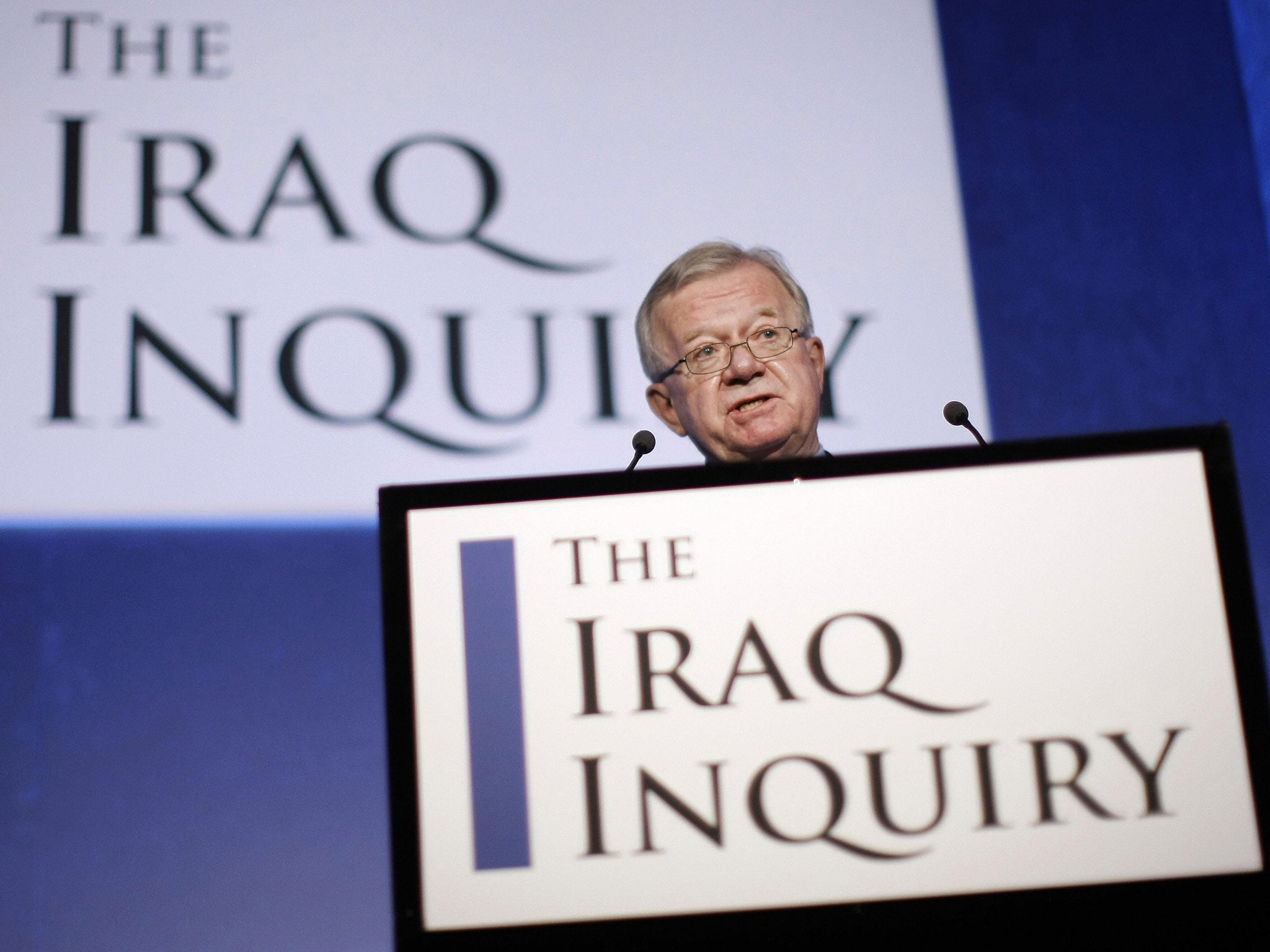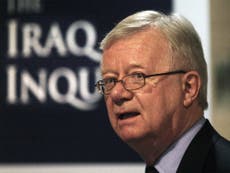Most independent inquiries like Chilcot fail – we should give Parliament the job
Public inquiries are no more than a formalistic last resort, open to specious legal argument and manipulation


It is hard to recall the fanfare and – yes – the excitement, that attended the early weeks of the Iraq inquiry. The inquisitorial manner of the chairman, Sir John Chilcot, raised hopes that the truth, the whole truth, about Britain’s greatest foreign policy disaster since Suez would finally be told. Thanks to television, panel members found themselves recognised and praised in the streets.
Six years on, the inquiry has still not reported. One of its members – the historian, Sir Martin Gilbert – has died. MPs are unhappy. The Prime Minister has sent a letter expressing his frustration. Relatives of soldiers killed in Iraq are mooting a lawsuit to force a deadline for publication. The great and the good are offering advice from the margins. And the beleaguered Sir John – now seen more as an establishment fuddy-duddy than a doughty fighter for truth – has issued a statement of his own, saying in essence that it will take as long as it takes.
Maxwellisation, the process whereby those criticised have a pre-publication right to respond, is not the only reason. Disputes within government and the Civil Service, and between the UK and the US about which documents can and should see the light of day, have also contributed, with Sir John reportedly fighting for more openness than the custodians of state secrets wanted to give. If this is true, then some of the public dissatisfaction may be misplaced.
The increasing focus on Sir John and the evident shortcomings of this inquiry, however, may perhaps be obscuring a more useful and radical conclusion. How many inquiries – with whatever status, drawn up under whatever format – can honestly be adjudged successes in recent years? Might it not be time to jettison the lot, and look for another solution?
Arms for Iraq, published in 1996, but relating to the early 1980s, left much of the evidence secret and was widely condemned as a travesty. The 1998 public inquiry into the Stephen Lawrence murder investigation became known for Sir William Macpherson’s conclusion about “institutional racism” in the police, but serious gaps in the findings have subsequently emerged.
The Saville Report (2010) into Bloody Sunday was praised by David Cameron among others for its thoroughness – but took 12 years to come to fruition, and its significance was always at least as political as historical. Hutton and Butler, the previous two inquiries into the Iraq war, were so narrowly framed as to create the need for a third: Chilcot. We await the conclusions of the Litvinenko inquiry, but it was convened a full eight years after the Russian’s death and much of the evidence has been heard only by the judge.
And how many months and false starts did it take for the promised inquiry into historical sexual abuse to get under way? In the end, the Home Secretary brought in a judge from New Zealand, and the proceedings are expected to take years. The police investigations, already mired into acrimony, hardly provide a promising backdrop. I can think of only two inquiries that really justified themselves: Lord Scarman’s inquiry into the 1981 Brixton riots – which has stood the test of time remarkably well; and, more recently, the 2010 inquest into the 7/7 London bombings, under Lady Justice Hallett. The latter was technically an inquest rather than the public inquiry many had demanded, but it fulfilled essentially the same function.
The two have several features in common. They were conducted by senior judges, who received wide discretion as to their brief and stood no messing. They met a strict timetable: Scarman was convened the day after the April riots and reported in the November of that year; the 7/7 inquest took seven months from start to publication. Most crucially, though, they involved many ordinary members of the public, who gave their authentic view. They were not just about institutions and policy.
Most of the unsatisfactory inquiries – and Chilcot qualifies here, if only for the delay – are primarily about failures of institutions, and failures of policy. They are called by the government of the day, largely in response to a public clamour, to show that “something is being done” and to offer some assurance that lessons will be learned. Invariably, they do neither. They are no more than a formalistic last resort, open to specious legal argument and manipulation.
What is more, the alternative is staring us in the face. When government fails, as it clearly did over Iraq – or ministers, as they did in the “arms for Iraq” scandal, or the Army over Bloody Sunday – there should be no need for an inquiry of any sort. We have an institution that is supposed to hold power to account, and that institution is Parliament. It is Parliament, as a body or through its committees, that should represent our interests. And if that fails, there are the courts – and now the Supreme Court.
It is true that the UK does not have the same clear separation of powers as the United States, but the clout of parliamentary committees has been increasing, and special commissions, including MPs and peers, can be convened to consider specific questions. The Banking Commission has set an example of thoroughness, straight-talking and recognition of the public interest. What Parliament lacks is the power of sanction, including dismissal, impeachment, or referrals to court. This is where change should happen.
Considered internationally, the UK has a lamentable record in learning from policy mistakes. Our adversarial system for everything may be partly to blame – an inquisitorial system, as preferred on the continent, could produce better results. But passing the buck to ineffectual and interminable inquiries, often years after the event, should now be seen as a tried, tested and ruinously expensive way of making bad mistakes worse. Can we learn at least this from Chilcot?



Join our commenting forum
Join thought-provoking conversations, follow other Independent readers and see their replies